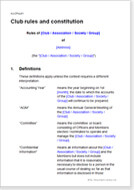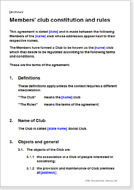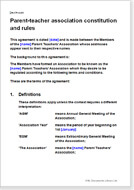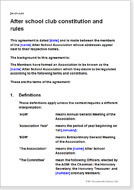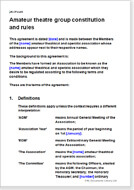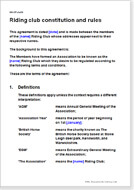Within our range of club constitution and rules templates there should be one that can easily be adapted to suit your club or association, whether you are a sports club with property and a members' bar, or an environmental campaign group that uses whatever resources are available when needed.
Club rules and constitution
This is the perfect constitution for your club or association or society. It covers all your basic requirements very thoroughly. It sets out the constitution and rules in a sensible, practical way with notes of advice too. Needs no legal expert support and no registration. Just go with it.
Members' club constitution and rules
Comprehensive agreement for any type of unincorporated association where there is no property and no alcohol license.
Parent-teacher association constitution and rules
Comprehensive terms and conditions, or rules for a parent teacher association. Suitable for any group who collaboratively wish to improve co-operation between families and the school and between teachers and pupils, to promote fairs, fetes, raffles and so on, to provideeducational activities for the children, and supervision for extra-curricular activities, classroom volunteers wherever necessary, to assist with transport to and from the school or for any other reason.
After school club constitution and rules
Comprehensive terms and conditions, or rules for an after school group, club or association. The objectives of the group are variable. We have included provision for the organisation of: arrangements for the children after school including supervision, raising funds by way of fetes or raffles to help with the group objectives, providing refreshments and entertainment in a home environment, after school and so on.
Amateur theatre group constitution and rules
All-embracing terms and conditions, or rules for an amateur theatre group, club or association to promote the stage production of plays, operas and operettas and other performances, to raise funds to carry out the objectives, to hire halls, theatres and other venues to enable the performances to go ahead and so on.
Riding club constitution and rules
Comprehensive terms and conditions, or rules for an equestrian club of any sort, for example, a riding club. The exact purpose and objectives could are wide-ranging - some could be, for example, to encourage and promote riding and equestrian activities, to organise instructional meetings, lectures and competitive events, to organise hacking under appropriate supervision, to be affiliated to the Australian Stock Horse Society and so on.

If the document isn’t right for your circumstances for any reason, just tell us and we’ll refund you in full immediately.

We avoid legal terminology unless necessary. Plain English makes our documents easy to understand, easy to edit and more likely to be accepted.

You don’t need legal knowledge to use our documents. We explain what to edit and how in the guidance notes included at the end of the document.

Email us with questions about editing your document. Use our Lawyer Assist service if you’d like our legal team to check your document will do as you intend.

Our documents comply with the latest relevant law. Our lawyers regularly review how new law affects each document in our library.
When to put a constitution in place
It is usual to draw your constitution at the time when you set up your club or association. However, you can improve it any time.
These documents are suitable for a wide range of organisations. The members may share a common interest, activity or goal. You can also use one of them to form a community or voluntary group that you might wish to register as a charity in the future.
Our aim has been to set out a clear and logical structure by which to manage your organisation, association, club or group. We have provided variations for a few specific types of organisation. Just choose the type which you think might come closest to your organisation.
What these documents can do for you
A framework of rules
When people get together without forming a company, there is no set of rules which is automatically applied. To run the organisation efficiently you therefore have to put a document together. Because there is no standard for this, you can say what you like. Agreeing terms with colleagues is often difficult. We provide that framework - flexibly so that you can select what you want.
Operating like a business
Many organisations have a specific purpose in the nature of a business. Examples are a theatre group or a sports club with employees. Those organisations cannot function without a constitution. In these documents we have borrowed familiar concepts and words from company law so that meetings are run smoothly and each person knows what he has agreed to do.
Presentation of your organisation to third parties
Organising events of any sort usually involves conducting business with sponsors and distributors, managing finances, and collaborating with external teams. A well-defined constitution shows a level of professionalism, which will be noticed by those other people and businesses.
Better personal legal protection
A company is of course a legal “person”, but a club or organisations is not. So any contract relating to club activity must be made by individual members on behalf of the others. If anything goes wrong, those are the people who will be expected to pick up the pieces. A well-drawn constitution sets clear guidelines and boundaries for who can do what, so that you all know who is responsible and the extent of the liability of any one of you.
The law relating to club constitutions
A club or society has no legal identity of its own beyond the identity of the individual members. That means that the members are personally responsible for any liabilities (debts or obligations) that arise. The scope for disagreement is substantial, leaving one or more members liable for debts or negligence they thought would be covered by a larger group or by some other arrangement.
The management of personal liability of members is therefore one of the strongest reasons to have a formal constitution. If you, as a member, are liable for decisions made by another member, you’ll want to make sure that decisions are made with your full knowledge of any risk and with your agreement.
Features and contents of these templates
Property ownership and alcohol licence
If the organisation wishes to own land, some person or group of people must take legal ownership on behalf of all members or of the committee, as you decide. That ownership requires “rules” about maintenance, money and even disposal.
In a similar way, if you want to sell alcohol, you need a licence and someone must formally apply for a licence in his name. This is not a problem in relation to an agreement in this set. We merely note that it is covered.
Other provisions
To cover all of the problems you might encounter requires a long document.
We have carefully drawn each of these documents so that each contains what you need (with many options) but contains as little as possible of what you do not need.
Examples of points a template covers include:
- Name and objects of the club
- Membership: qualifications and membership types
- Entrance fees and subscriptions
- Payments and arrears
- Resignation, expulsion and bankruptcy of members
- General Management Committee
- Sub-committees
- Proposal of candidates for committees
- Elections
- Secretary and other employees
- Borrowing and other powers
- Meetings: when and where, special procedures and so on
- Voting at meetings
- Financial year
- Audit of accounts (optional)
- Opening of club premises
- Purchase and supply of alcohol
- Data protection
- How and when the rules can and will be amended
- Dissolution
All rights reserved

